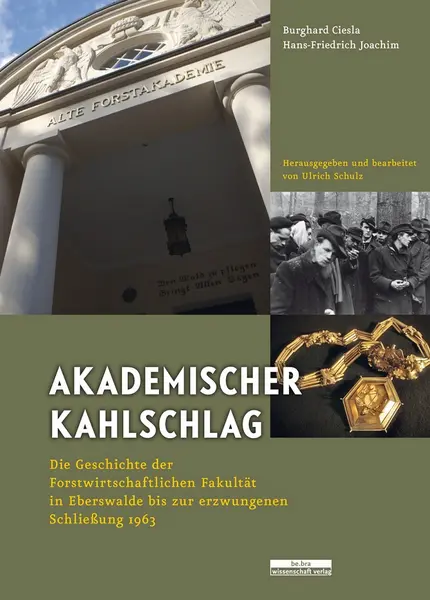History of our university
Origin
In 1821, forestry education was established at Berlin University by the forestry scientist Wilhelm Pfeil. Nine years later, however, he came to the conclusion that forestry science could not be successfully taught and learned without a teaching forest.
With the support of Alexander von Humboldt, then advisor to the Ministry of Finance, the "Höhere Forst Lehranstalt" (Higher Forestry School) was finally relocated to Eberswalde. In the years that followed, it developed into an internationally recognised centre for forestry, wood and soil sciences.
Names such as Adam Schwappach and Alfred Dengler had a major influence on the disciplines. In particular, the location and sustainability of forest management have always been central themes.
Eberswalde Forestry Academy
In 1866, Bernhard Danckelmann took over as head of the educational institution. Under his leadership, it was renamed the "Forestry Academy" and gained international renown. His successor, Alfred Möller, also contributed to the academy's development by extending the duration of studies and constructing a new library and administration building.
Closure of the academy
During the war years, teaching and research activities were only maintained on a makeshift basis. At the end of the war, Professor Johannes Schubert showed great commitment and negotiating skills in his efforts to restart teaching activities.
However, the ruling party and government of the GDR brought this to an abrupt end in 1963. Despite its positive post-war development, the Eberswalde faculty was closed without replacement. It was only after the political change that restructuring took place.
Reestablishment
On 1 April 1992, it was finally re-established as the Eberswalde University of Applied Sciences. Since then, the range of courses on offer has been steadily expanding. Particular attention is paid to sustainability in teaching and research. This development was reflected in the renaming of the university in 2010 to the University of Applied Sciences for Sustainable Development (FH). Since 2015, the abbreviation (FH) has no longer been included in the official name.
Chronicle of the HNEE
2024: | Gewinnerin des Deutschen Nachhaltigkeitspreises im Sektor "Bildung und Forschung" in der Branche "Schulen und Hochschulen" |
|---|---|
2024: | Eberswalder Institut für Biosphärenreservate, das Biosphere Reserves Institute (BRI), wird UNESCO Kat-2 Institut |
2023: | Gründung des Bachelorstudiengangs "Ernährungs- und Agrarkultur nachhaltig gestalten" |
2023: | Finalistin "Deutscher Nachhaltigkeitspreis" |
2023: | Nationale Auszeichnung – BNE "Lernort" |
2022: | Start der Binnenstrukturreform der Hochschule |
2021: | Neues Hochschulleitbild |
2017: | Auszeichnung mit dem EMAS-Award |
2015: | Umbenennung des Fachbereichs Holztechnik in Fachbereich Holzingenieurwesen |
2014: | Gründung des Masterstudienganges "Nachhaltige Unternehmensführung" |
2014: | 1. klimaneutrale Hochschule Deutschlands |
2013: | Gründung des Masterstudienganges "Strategisches Nachhaltigkeitsmanagement" |
2011: | Umbenennung des Fachbereichs Wirtschaft in Fachbereich Nachhaltige Wirtschaft |
2010: | EMAS-Zertifizierung und Auszeichnung mit dem EMAS-Award |
2010: | Gründung des Masterstudienganges "Kommunalwirtschaft" |
2010: | Umbenennung in "Hochschule für nachhaltige Entwicklung Eberswalde" |
2007: | Gründung des Masterstudienganges "Marketing-Management" |
2007: | Gründung des Masterstudienganges "Öko-Agrarmanagement" |
2007: | Umbenennung des Fachbereichs Forstwirtschaft in Fachbereich für Wald und Umwelt |
2007: | Einführung eines strukturierten Umweltmanagwmentsystems |
2006: | Gründung des Masterstudienganges "Global Change Management" |
2006: | Gründung des Masterstudienganges "Regionalentwicklung und Naturschutz" |
2005: | Beginn der Umstellung auf Bachelor-Master-Abschlüsse |
2005: | Gründung der Bachelorstudiengänge "Finanzmanagement" und "Unternehmensmanagement" |
2005: | 1. Master Class Course Conference Renewable Energies |
2004: | Gründung des Bachelorstudienganges "Ökolandbau und Vermarktung" |
2004: | Gründung des Bachelorstudienganges "Regionalmanagement" |
2003: | Gründung des Masterstudienganges "Nachhaltiges Tourismusmanagement" |
2002: | Umbenennung des Fachbereichs Betriebswirtschaft in Fachbereich Wirtschaft |
2002: | Gründung des Masterstudienganges "Forest Information Technology" |
1999: | Wahl zur ersten studentischen Vizepräsidentin Deutschlands - Anke Hollerbach |
1998: | Gründung des Bachelorstudienganges "International Forest Ecosystem Management" |
1996: | Anschluss an das Internet (9,6kbit/s) |
1995: | 1. Eberswalder Holzkonferenz am Fachbereich Holztechnik |
1994: | Gründung des Fachbereichs Betriebswirtschaft |
1993: | Gründung des Fachbereichs Holztechnik |
1993: | Gründung des Fachbereichs Landschaftsnutzung und Naturschutz |
1992: | Gründung des Fachbereichs Forstwirtschaft |
1992: | Neugründung als "Fachhochschule Eberswalde" |
1963: | Schließung der Eberswalder Fakultät |
1866: | Umbenennung in "Forstakademie" |
1830: | Gründung der "Höheren Forst Lehranstalt" in Eberswalde |
